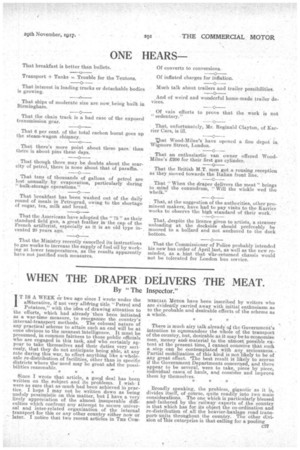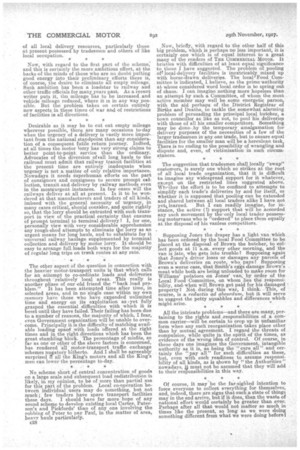WHEN THE DRAPER DELIVERS THE MEAT.
Page 3

Page 4

If you've noticed an error in this article please click here to report it so we can fix it.
By "The Inspector."
IT IS A WEEK osr two ago since I Wrote under the alliterative, if not very allifring title "Petrol and Potatoes," with the idea of drawing attention to the efforts, which had already 'then been initiated as a war-time measure, to reorganize the country's internal-transport methods. The colossal nature of any practical scheme to attain such an end will be at once obvious to the meanest intelligence. It must be presumed, in common fairness to those public officials who are engaged in this task, and who certainly appear to take themselves and their duties very seriously, that they do not anticipate being able, at any rate during this war, to effect anything like a-wholesale re-distribution of facilities, other than in specific districts where the need may be great and the possi
bilities reasonable. . .
Since I wrote that article, a good deal has been written on the subject and its problems. I wish, I were as sure that as much had been achieved in practice. I hope I may not be written down as being unduly pessimistic on this matter, but I have a very lively' appreciation of the almost insuperable difficulties which confront any attempt to secure universal and inter-related organization of the internal transport for this or any other country either now or .' later. I notice that two recent articles in THE COM MERCIAL MoToa have been inscribed by writers who are evidently carried away with initial enthusiasm as to the probable and desirable effects of the scheme as a whole.
There is much airy talk already oi the Government's intention to cmmandeer the whole of the transport of the country, but, desirable as it-may be-to economise men, money ando material to.the utmost possible extent at the present time, I Cannot conceive that such a , step can be contemplated with any seriousness.. Partial mobilization of this kind is not any to be of any great effect. The best result is likely to accrue if the Government Departments concerned, and there appear to be several, were to take, piece by piece, individual eases' of hauls, and consider and improve them by themselves.
Broadly speaking, the problem, gigantic as it is, divides itself, of course, quite readily into two main considerations. The one which is particularly blessed and fathered by the railway experts of the country is that which has for its object the co-ordination and re-distribution of all: the heavier-haulage road transport= Units. throughout the country. The other division of this enterprise is that calling for a pooling of all local delivery resources, particularly those at present possessed by tradesmen and others of like local occupation.
Now, with regard to the first part of the scheme and this is certainly the more ambitious effort, at the backs of the minds of those who are no doubt putting good energy into their preliminary efforts there is, of course, the desire to eliminate all empty mileage. Such ambition has been a loadstar to railway and other traffic officials for many_years past. As a recent writer puts it, tbn mileage has to be increased, and vehicle mileage reduced, where it is in any way.posBible. But the problem takes on certain entirely new aspects in these times of war and of restrictions of facilities in all directions.
Desirable as it may be to cut out empty mileage wherever possible, there are many occasions to-day when the urgency of a delivery is vastly more important from the national standpoint than any consideration of a consequent futile return journey. IncThed, at all times the motor lorry has very strong claims to better paint-to-point, service than the ordinary. Advocates of the diversion dial' long hauls to the railroad must admit that railway, transit facilities at the present time are entirelyinadequate when urgency is not a matter of only relative importance. Nowadays it needs Superhuman efforts on the part of consignors and consignees to secure prompt collection, transit and delivery by railway methods even in the mostSurgent instances, in few cases will the railways deliver at all at present. Is it to be wondered at that manufacturers and traders of all kinds: imbued with the general necessity of urgency, in many cases critical, should consider, and quite rightly so, that the lorry should be entrusted with such transport in view of the practical certainty that ensures of prompt terminal to terminal delivery ? I, for one, personally view with very considerable apprehension any rough-shod attempts to eliminate tile lorry as an urgent means for long hauls, and to substitute for it universal railway haulage supplemented by terminal collection and delivery by motor lorry. It should be easy to arrange full loads both ways for the majority of regular long trips on trunk routes at any rate.
The other aspect of the question in connection with the heavier motor-transport units is that which calls for 'an attempt to co-ordinate loads and deliveries throughout relatively local areas. This really is another phase of our old friend the "back load problem." It has been attempted time after time, in selected areas, and in no single case within my own memory have those who have expended unlimited time and energy on its exploitation as .yet fully grasped the essential difficulties with which it is beset until they have failed. Their failing has been due to a number of reasons, the majority of which, I fear, even Government organization will be unable to overcome. Principally it is the difficulty of matching available loading spaed with loads olfered at the right times and in the right directions which has been the great stumbling block. The percentage of misfits, so far as one or other of the above factors is concerned, has rendered all• motor-transport traffic exchange schemes nugatory hitherto. And I shall be agreeably surprised all the King's motors and all the King's men can lower the percentage to-day.
No scheme, short of central concentration of goods on a large scale and subsequent load redistribution is likely, in my opinion, to be of more than partial use for this part of the problem. Local co-operation between individual users may do something, but not much ; few traders have spare transport facilities these days. I should have far more hope of any sound scheme to develop existing local Carter, Paterson's and Pickfords' than of any one involving the robbing of Peter to pay Paul, in the matter of area, heavy hauls particularly.
c28
Now, briefly, with regard to the other half of this big problem, which is perhaps -no less important, it is certainly one which is of equal interest to a great many of the readers of THE COMMERCIAL MOTOR. It bristles with difficulties of at least equal significance to those I have suggested. The problem of pooling of local-delivery facilities is inextricably mixed up with horse-drawn deliveries. The local' Food Committee is indicated, I believe, as the prime 'authority at. whose considered word local, order is to spring out of chaos. I can imagine nothing more hopeless than an attempt by such a Committee, of whom the most active member may well be some energetic parson, with the aid perhaps of the District Registrar of Births and Deaths, to tackle the somewhat alarming problem of persuading the principal local butcher, a town councillor as like as not, to pool his deliveries with those of all his smaller competitors. Something may be doneoby the temporary amalgamation for delivery purposes of the necessities of a few of the larger tradesmen in any one trade, but to ensure equal facilities for the smaller man will be a herculean task, There is no ending to the possibility of wrangling and dispute and, even, of victimization in such circumstances.
The suggestion that tradesmen shall locally "swap" customers, is surely one which so strikes at the root of all local trade organization, that it is difficult to imagine any widespread support for it whatever, ex.eept on the restricted lines suggested above. Whether the effort is to be confined to attempts to simplify each trade's deliveries by and for itself, or whether it is supposed that pooling can be extended and shared between all local traders alike I have not yetl. learned. But I can readily imagine, for instance, the active (?) support that will be accorded any such movement by the-only local trader possessing motorvans who is "ordered" to place them equally at the disposal of his vanless competitors.
Supposing Jones the draper has a light van which has been ordered by the 'local Food Committee to be placed at the disposal of Brown the butcher, to collect goods at 11 a.m. every other morning, and the van is late, who gets into trouble? Supposing again that Jones's driver loses or damages any parcels of Brown's deliveries en route, who pays ? Supposing even a worse case, that Smith's eggs damage Brown's meat while both are being unloaded to make room for Williams' potatoes on Jones' van; by order of the Local Food 'Committee, on whom .lies the responsibility, and when will. Brown get paid for his damaged property? Not during this war, I think. . This, of course, is a reduc tie ad absurdum but it will serve to suggest the petty squabbles and differences which
might arise.
All the intricate problems—and there are many, per-. taming to the rights and responsibilities of a common carrier—will be certain to crop up in unfamiliar form when any such reorganization takes place other than by mutual agreement. I regard the threats of compulsion, while quite in the spirit of the times, as evidence of the wrong idea of control. Of course, in these days one imagines the Government, intangible authority as it is, as being the "cure all" and certainly the "pay all" for such difficulties as these, but, even with suchreadiness to assume responsibility of all kinds, as is shown by. f' the Authorities" nowadays, 4 must not be assumed that they will add to their responsibilities in this way.
Of course, it may be the far-sigh.ted intention to force everyone to collect everything for themselves, and, indeed, there are signs that such a state of things may in the end arrive, but if it does, then the waste of national effort would certainly be greater than ever. Perhaps after all that would not matter so much in times like the present, so long as we were doing something different from what we were doing before!
























